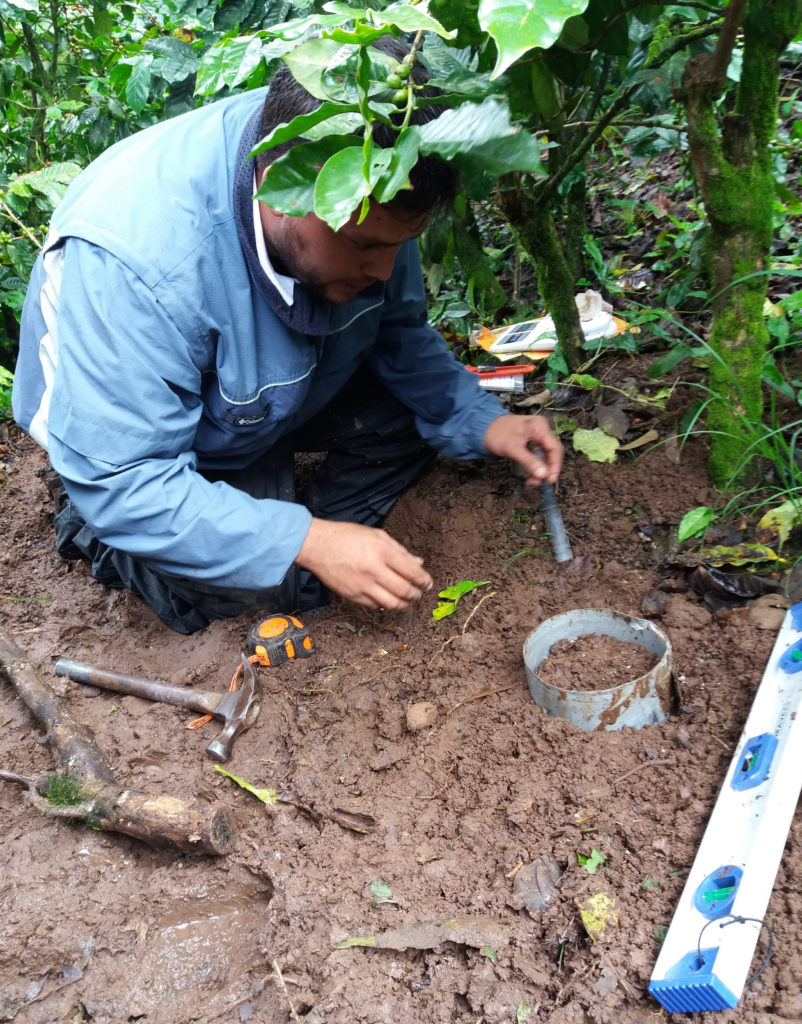By working together with all actors of a supply chain, we can tackle problems and identify solutions in a more sustainable and efficient way. CRS Blue Harvest seeks to protect and restore potable water resources in agricultural lands by promoting water and soil conservation practices and improving water governance.
In Central America, we work in coffeeland mountain ranges where many potable water sources are located. In Matagalpa, Nicaragua, as our work began, we found that many of the water sources for communities downstream were located in large coffee estates. This became a management challenge for CRS because our usual project participants are small farmers. We had to work as a team to reorient our focus and understand that if we wanted to protect water sources for populations we had to extend our scope to include groups with whom we didn’t usually engage.
To make matters more complicated, when our teams went to these large farms they would meet with the farm administrator, or Mandador, who had little decision making power on the farm. The owner usually didn’t live in the area, visited infrequently or was very hard to contact.
As we looked into the issue, we began to make connections along the supply chain. We realized that the best possible way to engage these farms was through the supply chain. These large coffee estates were tied to a buyer or exporter that they worked closely with to receive technical services and understand the needs of the market. With this in mind, we reached out to CISA Exportadora, a member of Mercon Coffee Group, to learn about their programming and sustainability focus.
What we found was a great farmer training program, LIFT, and a strong interest in integrating water and soil conservation practices in this program to ensure the future production of coffee. At the same time, we learned that some of their clients were the large farms located within the recharge areas of our priority water sources. And a relationship was born.
Since early 2016, CRS Nicaragua, through our Blue Harvest and Water-Smart Agriculture Programs, and CISA Exportadora have consolidated and implemented a work plan to create positive impact on water resources in Matagalpa.
This relationship has led to several activities:
- CRS has trained 36 CISA employees on the principles of soil restoration and fertility to increase yields and to improve water resource management. CISA has begun to replicate training with farmer participants in their LIFT program. Training topics have included soil restoration, soil quality monitoring, vegetative and soil nutrition, soil acidity management, water use efficiency and wastewater treatment in coffee milling among others.
- CISA has established 20 water and soil conservation monitoring plots within their farms to generate knowledge for influence in government and industry. Following Water-Smart Agriculture protocols promoted by CRS, CISA is implementing different practices according to soil needs to manage fertility and improve water infiltration. These include regulating pH, mulching and using biofertilizers.
- CRS, in coordination with CISA, farm owners, and administrators, has developed Water Resource Farm Management plans for three large farms. These farms contain water sources for populations downstream in the microwatershed, Yayule, which provides water for the urban city of El Tuma, Matagalpa. The plans include actions to protect the water sources located on the farm through physical barriers such a fencing; application of soil and water conservation practices such as live barriers, planting along contour lines, increase ground cover, and infiltration ditches within a 2500 m2 area around the water sources; reforestation; and improved water use and wastewater management in their onsite coffee milling. The actions are scheduled over a three-year period. This process was participatory, and the involvement of CISA was key to establishing commitment on behalf of the farm owners.
More on this in the near future as our relationship continues to evolve and we begin to see more results over time. May this serve as a replicable example for future programs and public-private sector collaborations.
– Maren Barbee, Regional Manager of Blue Harvest Central America, CRS
Mercon Coffee Group
The Mercon Coffee Group is a multinational, vertically integrated green coffee supplier committed to sustainability and offering the best client experience. Mercon’s sales offices and export operations are strategically located in four continents. Their operations in Nicaragua are led by CISA Exportadora, the largest coffee export company in the country.



